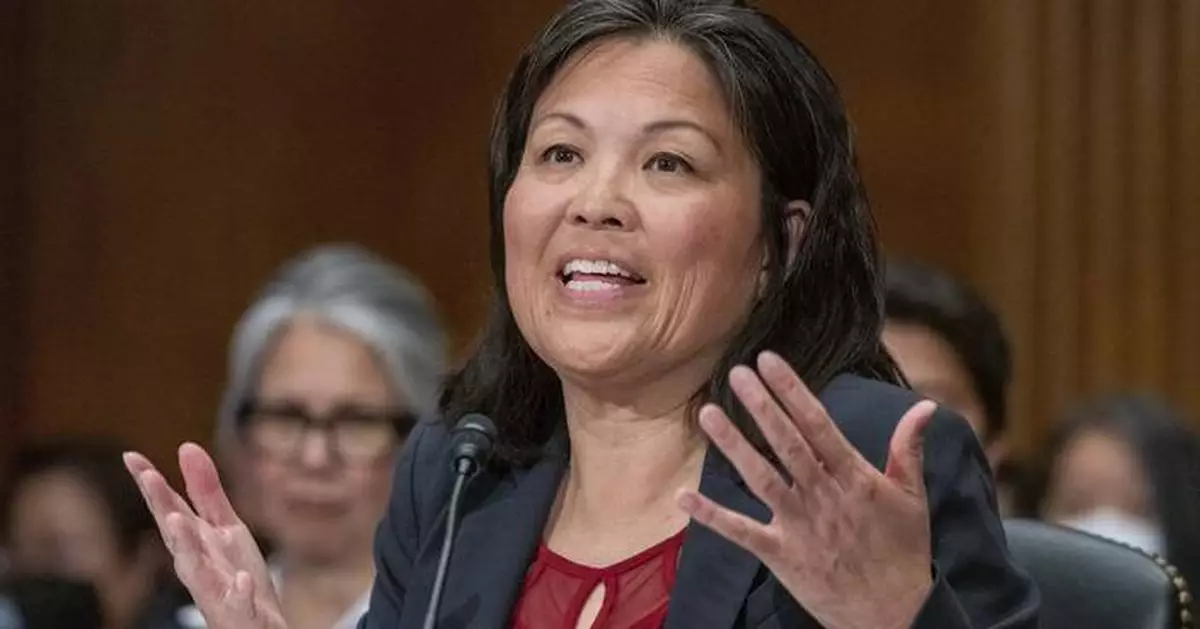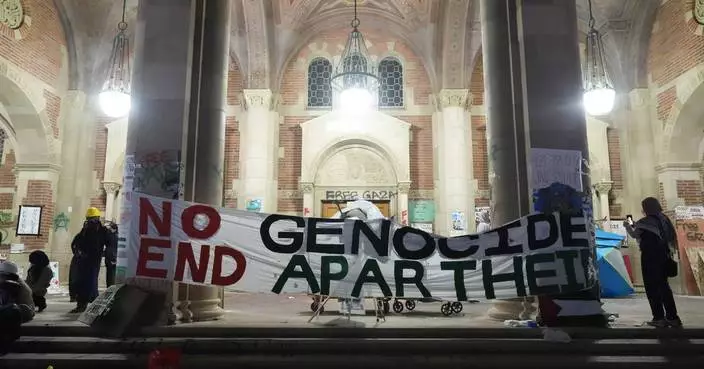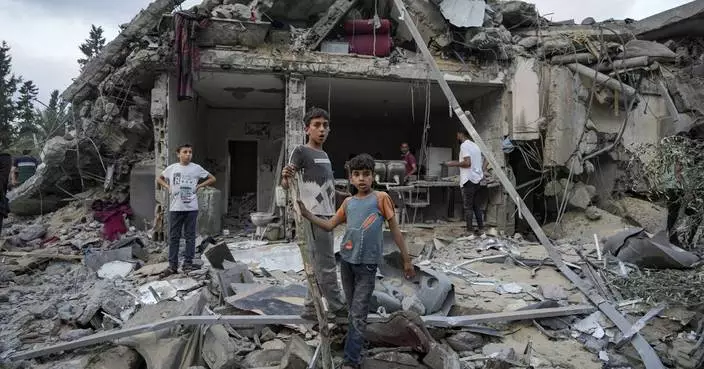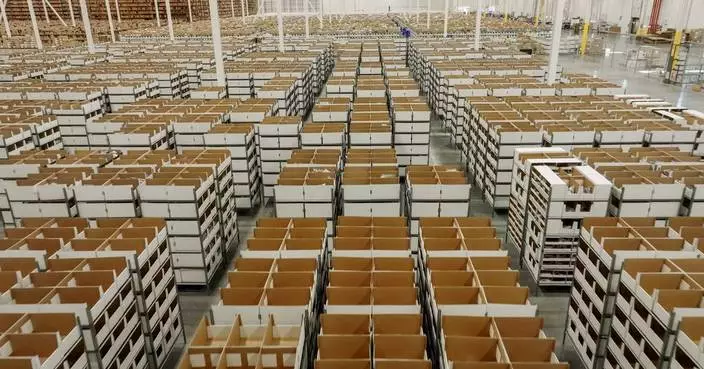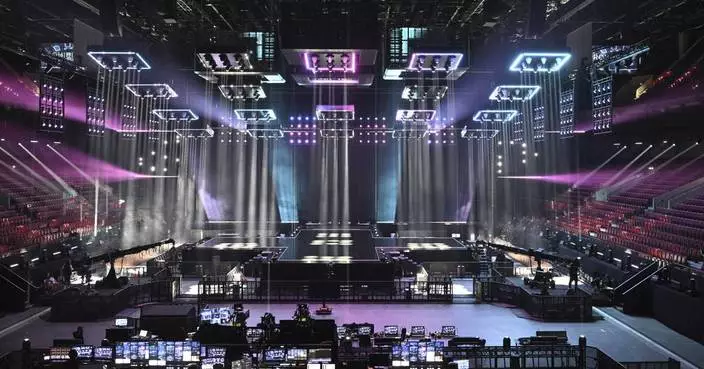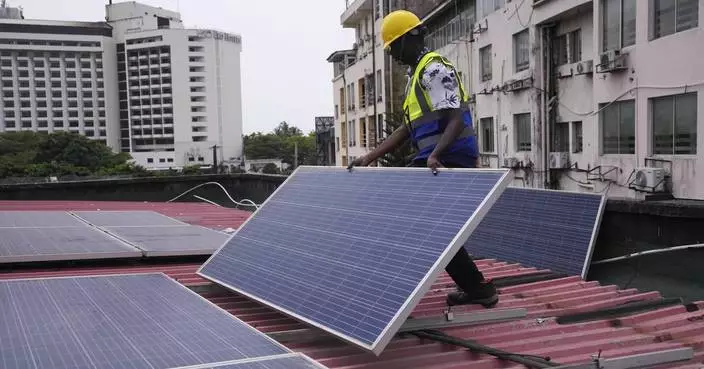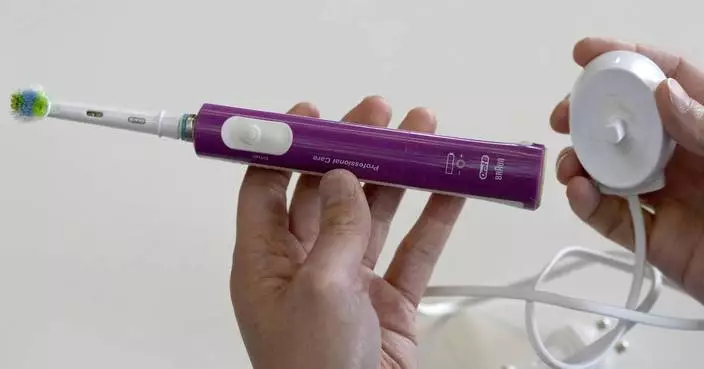WASHINGTON (AP) — Coal miners will be better protected from poisonous silica dust that has contributed to the premature deaths of thousands of mine workers from a respiratory ailment commonly known as black lung disease, the Labor Department said Tuesday as it issued a new federal rule on miners' safety.
The final rule, announced by Acting Labor Secretary Julie Su, cuts by half the permissible exposure limit for crystalline silica for an eight-hour shift.
Mine workers, community advocates and elected officials from Appalachian states have pushed for the stricter rule, noting that health problems have grown in recent years as miners dig through more layers of rock to gain access to coal seams when deposits closer to the surface have long been tapped. The increased drilling generates deadly silica dust and has caused severe forms of pneumoconiosis, better known as black lung disease, even among younger miners, some in their 30s and 40s.
“It is unconscionable that our nation’s miners have worked without adequate protection from silica dust despite it being a known health hazard for decades,” Su said Tuesday. “Today, we’re making it clear that no job should be a death sentence, and every worker has the right to come home healthy and safe at the end of the day.''
In Central Appalachia, an estimated one in five tenured coal miners has black lung disease. The condition reduces life expectancy by an average of 12 years and makes it a “struggle to get through a phone call or play with their grandkids without losing their breath,'' Su said in a speech in Uniontown, Pennsylvania, where she appeared with Cecil Roberts, president of the United Mine Workers of America, and other union leaders.
“For too long, we accepted this as just the way things are for people who work in mines,'' Su said. “They’ve had to work without the same protections from silica dust that people in other industries have, even though we’ve known about the harms of silica dust since Frances Perkins," who was labor secretary in the 1930s and 1940s.
The election-year rule shows "what it looks like to have the most pro-worker, pro-union president in history,'' Su said, a political comment referring to Democratic President Joe Biden.
Rebecca Shelton, director of policy at the Appalachian Citizens Law Center, which pressed for stricter rules to protect miners, said the group was reviewing the rule to ensure regulators from the Mine Safety and Health Administration accounted for comments by health professionals, attorneys and miners who have worked on the rule for years.
“There are too many lives at stake to get this wrong, and we’ll do whatever we can to ensure that this rule provides the protection that miners deserve,'' Shelton said.
Democratic senators from Ohio, West Virginia, Pennsylvania and Virginia hailed the new rule, saying it will be essential in safeguarding miners.
A spokesman for the National Mining Association said the group was reviewing the rule but supports the lower limits. The mining lobby has pushed to allow use of administrative controls and personal protective equipment to meet safety standards. “Unfortunately, those recommendations were not included in the final rule,″ said spokesman Conor Bernstein.
Vonda Robinson, whose husband, John, was diagnosed with black lung a decade ago at age 47, said she’s felt hopeful as officials considered the rule changes. But she was skeptical how the rule will be enforced.
Robinson, who lives in rural Nickelsville, Virginia, near the Tennessee line, said the mine safety office does not have enough staff or resources to adequately protect workers and their families.
“You can have rules, but until you back it up with enforcement, it’s not going to mean anything,” she said in an interview. “If they’re going to put out these rulings, you need to hire more people.”
The White House requested a $50 million increase to the mine safety office's budget for the current year, most of which would have been for more inspectors and enforcement. Congress rejected it, keeping the budget at the 2023 level of $388 million.
Vonda Robinson said her husband struggles every day. John Robinson worked in the mines for almost three decades. Two years ago, the couple met with a physician about a lung transplant.
“Until you see it and live with it, you don’t understand,” Vonda Robinson said. “And knowing what we’re looking at now -- miners being diagnosed at 32 – they’ll probably never see their children graduate or have grandchildren."
The Labor Department rule lowers the permissible exposure limit of respirable crystalline silica to 50 micrograms per cubic meter of air for a full-shift exposure, calculated as an 8-hour average. If a miner’s exposure exceeds the limit, mine operators must take immediate corrective actions.
The rule is in line with exposure levels imposed by the Occupational Safety and Health Administration on construction and other non-mining industries. And it’s the standard the Centers for Disease Control and Prevention was recommending as far back as 1974.
The Labor Department began studying silica and its impact on workers’ health nearly a century ago, but the focus on stopping exposure in the workplace largely bypassed coal miners. Instead, regulations centered on coal dust, a separate hazard created by crushing or pulverizing coal rock that also contributes to black lung.
In the decades since, silica dust has become a major problem as Appalachian miners cut through layers of sandstone to reach less accessible coal seams in mountaintop mines where coal closer to the surface has long been tapped. Silica dust is 20 times more toxic than coal dust and causes severe forms of black lung disease after even a few years of exposure.
Willingham reported from Charleston, West Virginia.
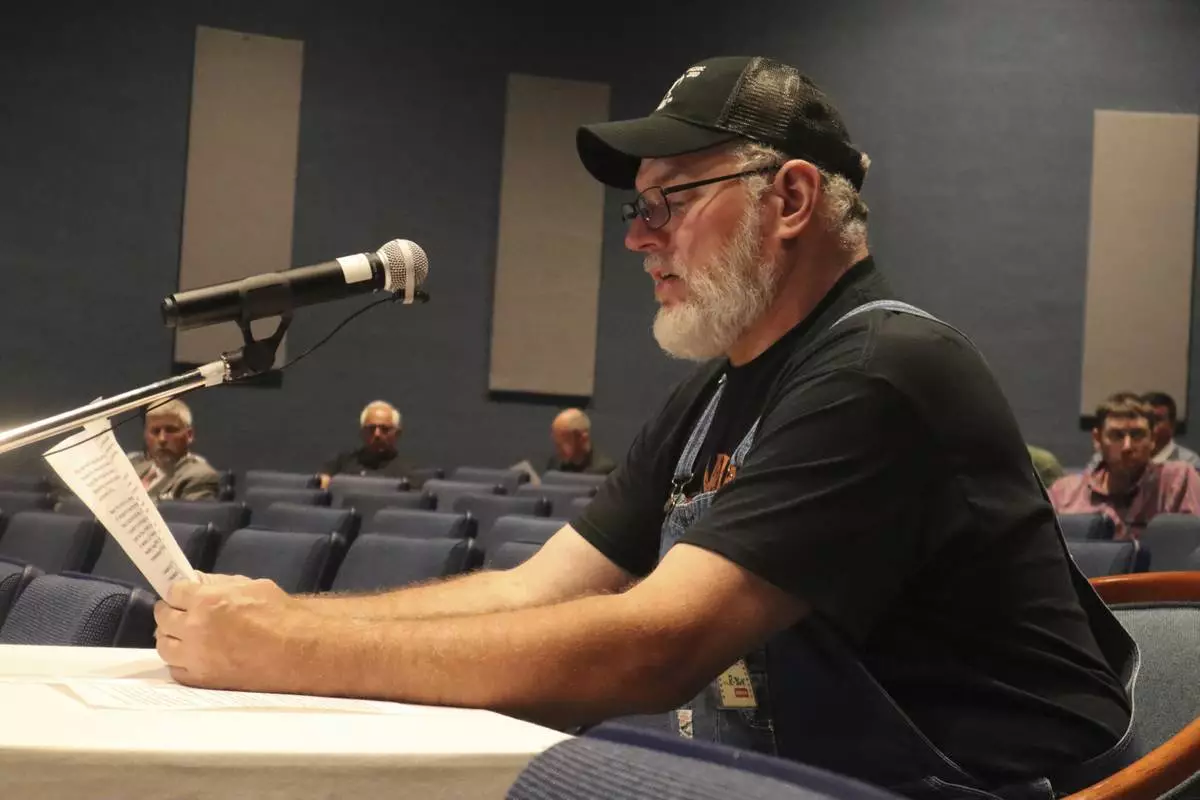
John Robinson, a retired coal miner with black lung, speaks during a public hearing hosted by the federal Mine Safety and Health Administration about its draft rule to limit worker exposure to silica dust, Aug. 10, 2023, at the agency’s office in Beaver, W.Va. (AP Photo/Leah Willingham)
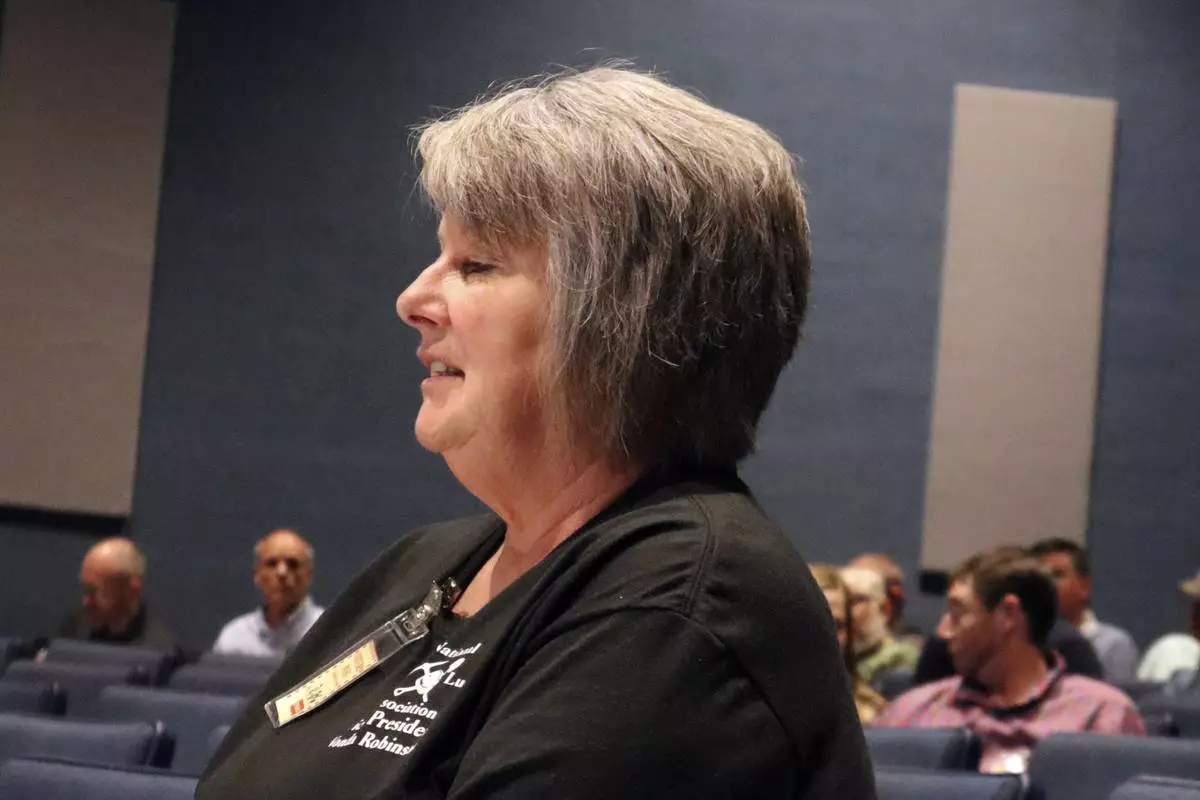
Vonda Robinson, vice president of the National Black Lung Association, speaks during a public hearing hosted by the federal Mine Safety and Health Administration about its draft rule to limit worker exposure to silica dust, Aug. 10, 2023, at the agency’s office in Beaver, W.Va. Vonda Robinson's husband, John Robinson, a retired miner, was diagnosed with black lung around a decade ago. (AP Photo/Leah Willingham)
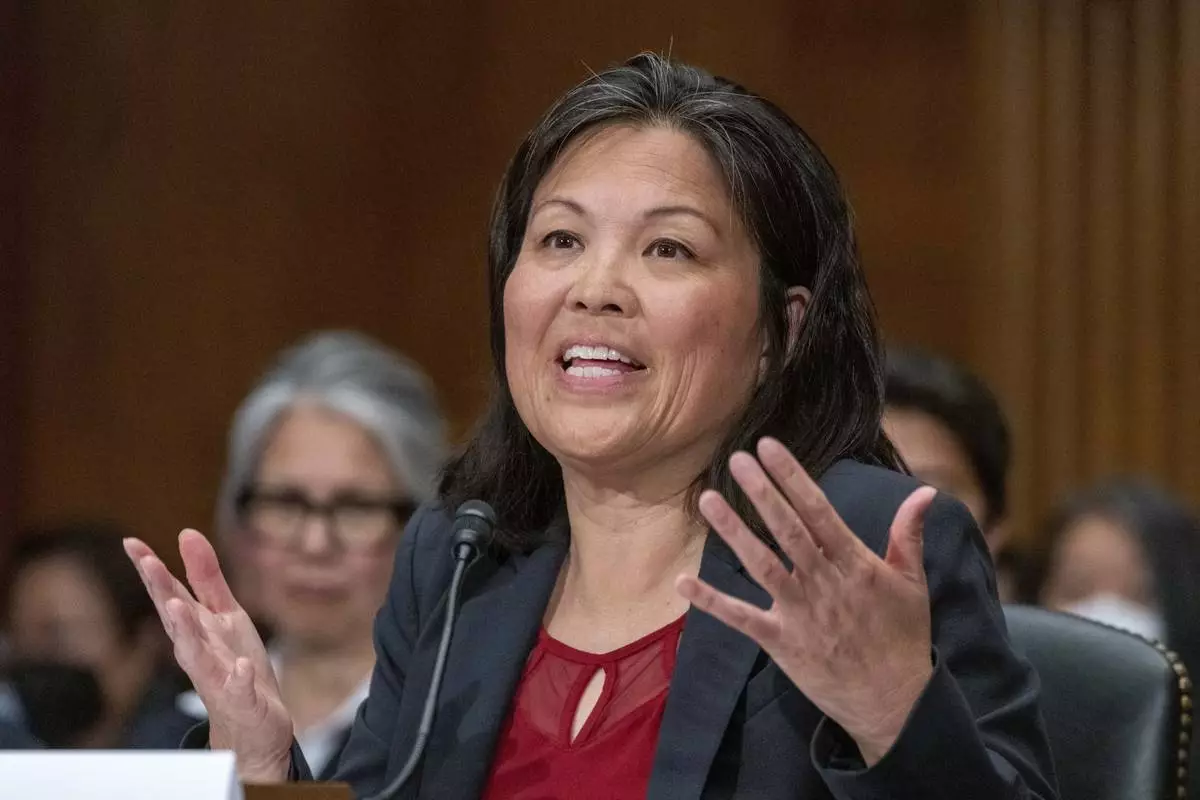
FILE - Julie Su speaks during a Senate Health, Education, Labor and Pensions confirmation hearing for her to be the Labor Secretary, on Capitol Hill, April 20, 2023, in Washington. The Labor Department moved Tuesday to better protect miners from poisonous silica dust that has contributed to the premature deaths of thousands of mine workers from a respiratory disease commonly known as “black lung.” (AP Photo/Alex Brandon, File)
LOS ANGELES (AP) — Police removed barricades and began dismantling a pro-Palestinian demonstrators’ fortified encampment early Thursday at the UCLA campus after hundreds of protesters defied police orders to leave, about 24 hours after counter-protesters attacked a tent encampment on the campus.
Police detained a handful of people on campus, tying their wrists with zip ties. The law enforcement action came after officers spent hours threatening arrests over loud speakers if people did not disperse. Hundreds of people had gathered on campus, both inside a barricaded tent encampment and outside of it in support.
As police helicopters hovered overhead, the sound of flash-bangs, which produce a bright light and a loud noise to disorient and stun people, could be heard as police moved in. Chants of “where were you last night" could be heard.
Police methodically ripped apart the encampment’s barricade of plywood, pallets, metal fences and trash dumpsters and made an opening toward dozens of tents of demonstrators. Police also began to pull down canopies and tents.
Demonstrators were holding umbrellas like shields as they faced off with dozens of officers. Some of the protesters warned their fellow demonstrators to be ready with water in case police release tear gas or other irritant.
The police action occurred a night after the UCLA administration and campus police waited hours to stop the counter-protesters’ attack. The delay drew condemnation from Muslim students and California Gov. Gavin Newsom.
Demonstrators rebuilt the makeshift barriers around their tents on Wednesday afternoon while state and campus police watched.
Tent encampments of protesters calling on universities to stop doing business with Israel or companies they say support the war in Gaza have spread across campuses nationwide in a student movement unlike any other this century. The ensuing police crackdowns echoed actions decades ago against a much larger protest movement protesting the Vietnam War.
In the Mideast, Iranian state television carried live images of the police action, as did Qatar’s pan-Arab Al Jazeera satellite network. Live images of Los Angeles also played across Israeli television networks as well.
The tense standoff at UCLA came one night after violence instigated by counter-protesters erupted in the same place.
The law enforcement presence and continued warnings stood in contrast to the scene that unfolded the night before, when counter-demonstrators attacked the pro-Palestinian encampment, throwing traffic cones, releasing pepper spray and tearing down barriers. Fighting continued for several hours before police stepped in, though no arrests were made. At least 15 protesters suffered injuries, and the tepid response by authorities drew criticism from political leaders as well as Muslim students and advocacy groups.
By Wednesday afternoon a small city sprang up inside the reenforced encampment, now full of hundreds of people and tents on the campus quad. Some protesters said Muslim prayers as the sun set over the campus, while others chanted “we’re not leaving” or passed out goggles and surgical masks. They wore helmets and headscarves, and discussed the best ways to handle pepper spray or tear gas as someone sang over a megaphone.
A few constructed homemade shields out of plywood in case they clashed with police forming skirmish lines elsewhere on the campus. “For rubber bullets, who wants a shield?" a protester called out.
Outside the encampment, a crowd of students, alumni and neighbors gathered on campus steps, joining in pro-Palestinian chants. A group of students holding signs and wearing T-shirts in support of Israel and Jewish people demonstrated nearby.
The crowd continued to grow as the night wore on as more and more officers poured onto campus.
Ray Wiliani, who lives nearby, said he came to UCLA on Wednesday evening to support the pro-Palestinian demonstrators.
“We need to take a stand for it,” he said. “Enough is enough.”
Elsewhere, police in New Hampshire said they made 90 arrests and took down tents at Dartmouth College and officers in Oregon came onto the campus at Portland State University as school officials sought to end the occupation of the library that started Monday.
The chaotic scenes at UCLA came after New York police burst into a building occupied by anti-war protesters at Columbia University on Tuesday night, breaking up a demonstration that had paralyzed the school.
An Associated Press tally counted at least 38 times since April 18 where arrests were made at campus protests across the U.S. More than 1,600 people have been arrested at 30 schools.
UCLA Chancellor Gene Block said in a statement that “a group of instigators” perpetrated the previous night's attack, but he did not provide details about the crowd or why the administration and school police did not act sooner.
“However one feels about the encampment, this attack on our students, faculty and community members was utterly unacceptable,” he said. “It has shaken our campus to its core.”
Block promised a review of the night's events after California Gov. Gavin Newsom denounced the delays.
The head of the University of California system, Michael Drake, ordered an “independent review of the university’s planning, its actions and the response by law enforcement.”
“The community needs to feel the police are protecting them, not enabling others to harm them,” Rebecca Husaini, chief of staff for the Muslim Public Affairs Council, said in a news conference on the Los Angeles campus Wednesday.
Speakers disputed the university’s account that 15 people were injured and one hospitalized, saying the number of people taken to the hospital was higher. One student described needing to go to the hospital after being hit in the head by an object wielded by counter-protesters.
Several students who spoke during the news conference said they had to rely on each other, not the police, for support as they were attacked, and that many in the pro-Palestinian encampment remained peaceful and did not engage with counter-protesters. UCLA canceled classes Wednesday.
At the University of Wisconsin in Madison, a scrum broke out early Wednesday after police with shields removed all but one tent and shoved protesters. Four officers were injured, including a state trooper who was hit in the head with a skateboard, authorities said. Four were charged with battering law enforcement.
This is all playing out in an election year in the U.S., raising questions about whether young voters — who are critical for Democrats — will back President Joe Biden's reelection effort, given his staunch support of Israel.
In rare instances, university officials and protest leaders struck agreements to restrict the disruption to campus life and upcoming commencement ceremonies.
At Brown University in Rhode Island, administrators agreed to consider a vote to divest from Israel in October — apparently the first U.S. college to agree to such a demand.
The nationwide campus demonstrations began at Columbia on April 17 to protest Israel’s offensive in Gaza, which followed Hamas launching a deadly attack on southern Israel on Oct. 7. Militants killed about 1,200 people, most of them civilians, and took roughly 250 hostages. Vowing to stamp out Hamas, Israel has killed more than 34,000 Palestinians in the Gaza Strip, according to the Health Ministry there.
Israel and its supporters have branded the university protests antisemitic, while Israel’s critics say it uses those allegations to silence opposition. Although some protesters have been caught on camera making antisemitic remarks or violent threats, organizers of the protests, some of whom are Jewish, say it is a peaceful movement aimed at defending Palestinian rights and protesting the war.
Meanwhile, protest encampments elsewhere were cleared by the police, resulting in arrests, or closed up voluntarily at schools across the U.S., including The City College of New York, Fordham University in New York, Portland State in Oregon, Northern Arizona University in Flagstaff, Arizona and Tulane University in New Orleans.
Offenhartz and Frederick reported from New York. Associated Press journalists around the country contributed to this report, including John Antczak, Christopher L. Keller, Lisa Baumann, Cedar Attanasio, Jonathan Mattise, Stefanie Dazio, Jae C. Hong, Colleen Long, Karen Matthews, Sarah Brumfield, Carolyn Thompson, Philip Marcelo, Corey Williams and Felicia Fonseca.

Police stage on the UCLA campus near an encampment set up by pro-Palestinian demonstrators Wednesday, May 1, 2024, in Los Angeles. (AP Photo/Ryan Sun)
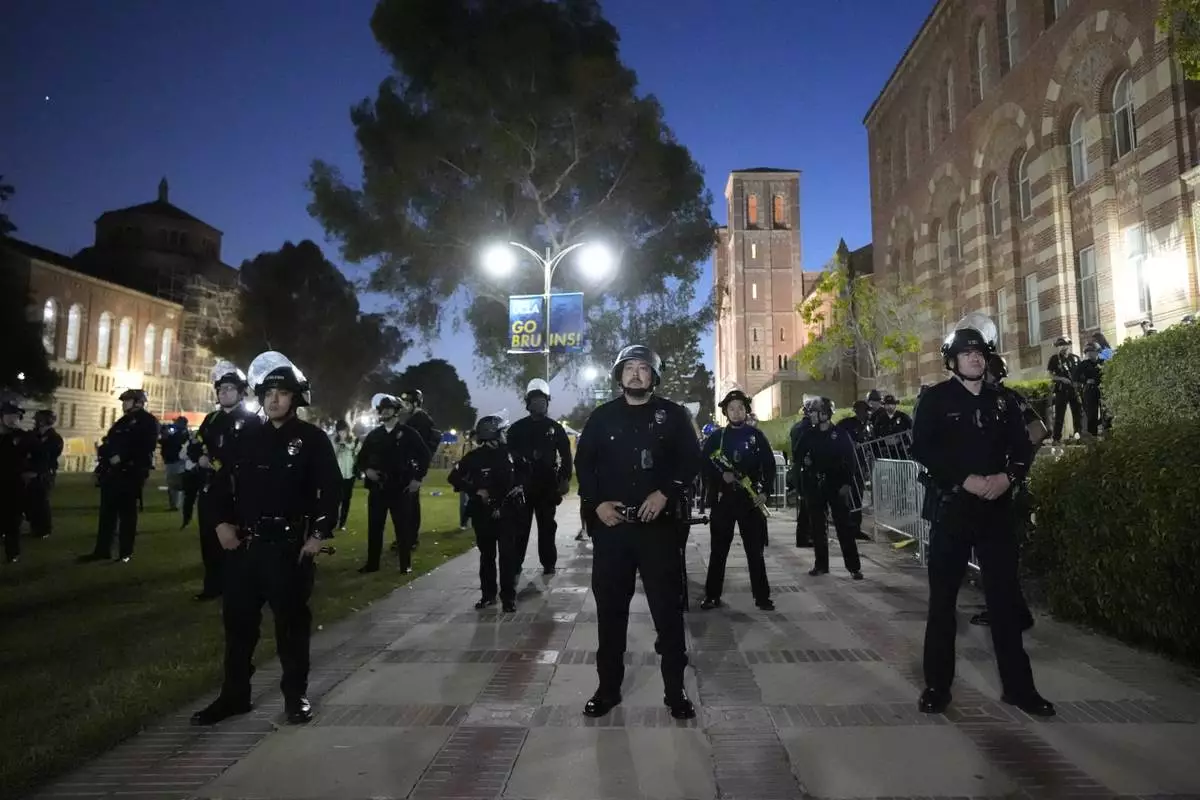
Police stage on the UCLA campus near an encampment set up by pro-Palestinian demonstrators Wednesday, May 1, 2024, in Los Angeles. (AP Photo/Ryan Sun)
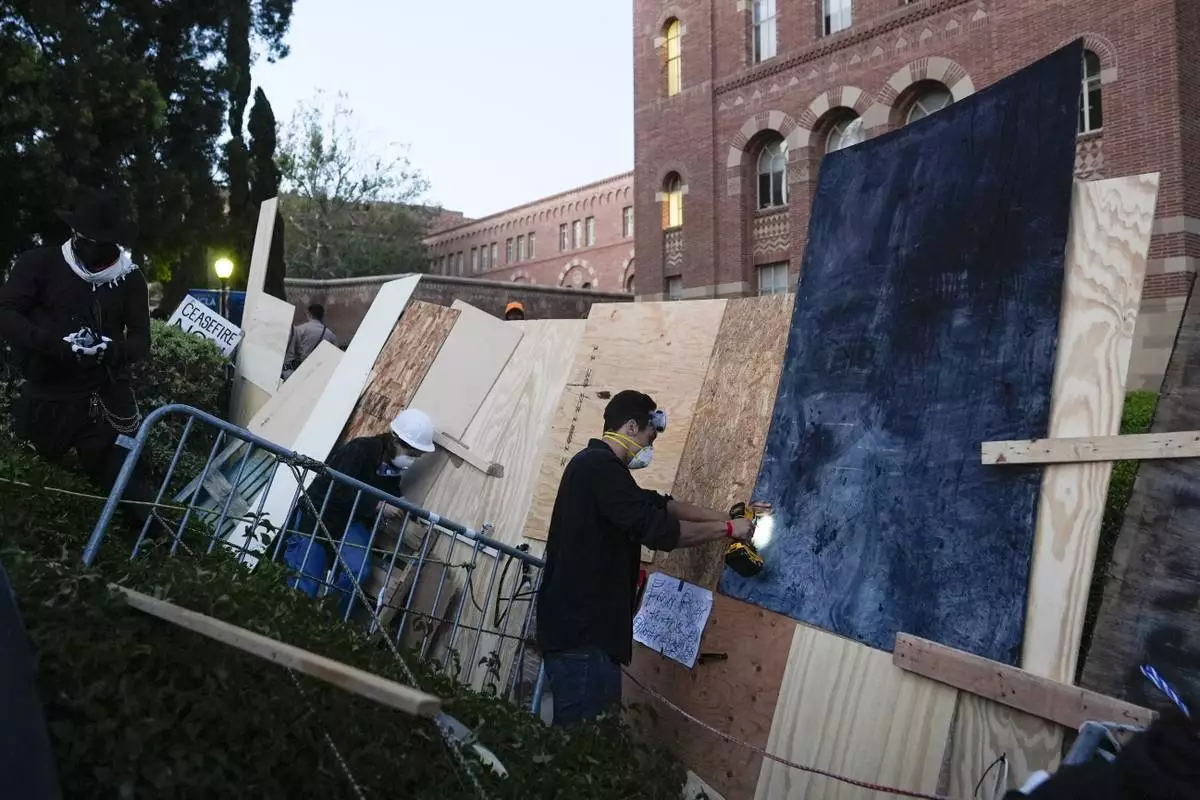
A person reinforces a barrier on the UCLA campus, after clashes between Pro-Israel and Pro-Palestinian groups the previous night, Wednesday, May 1, 2024, in Los Angeles. (AP Photo/Jae C. Hong)
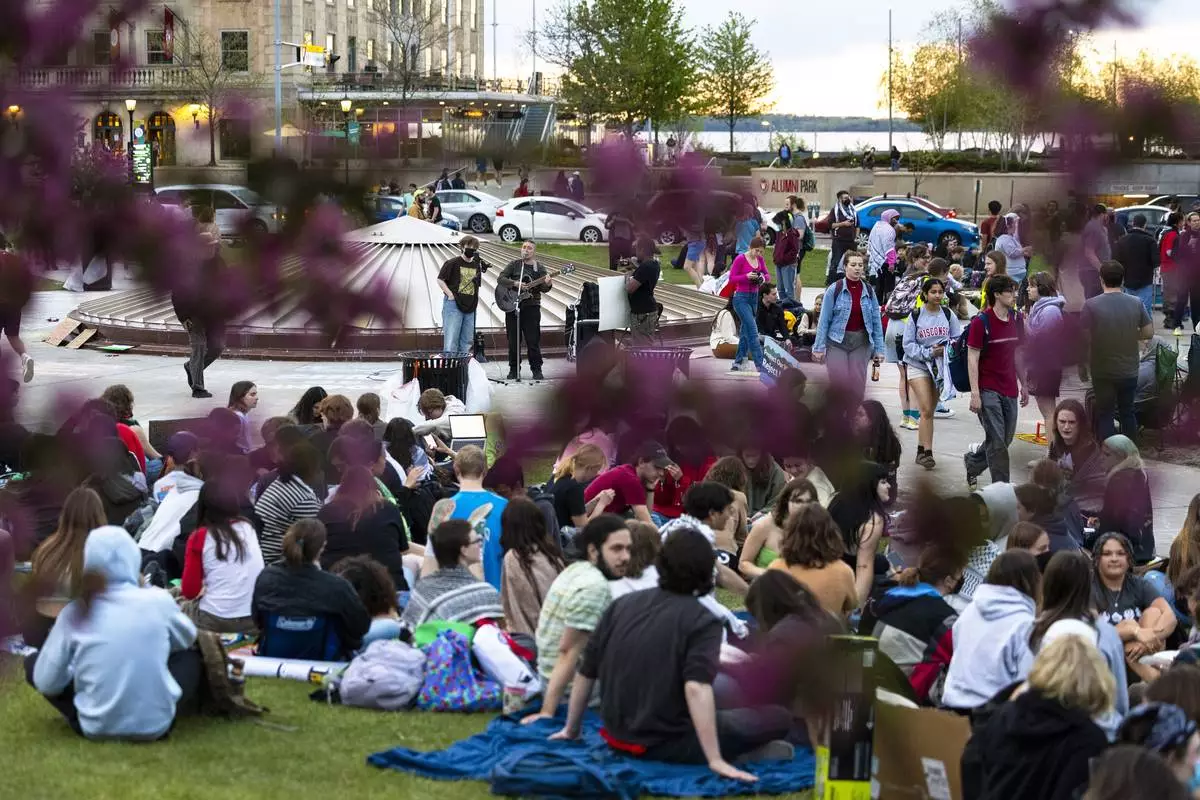
A musician performs as Pro-Palestinian demonstrators protest at their encampment at Library Mall on the campus of the University of Wisconsin in Madison, Wis., Wednesday, May 1, 2024. (Samantha Madar/Wisconsin State Journal via AP)
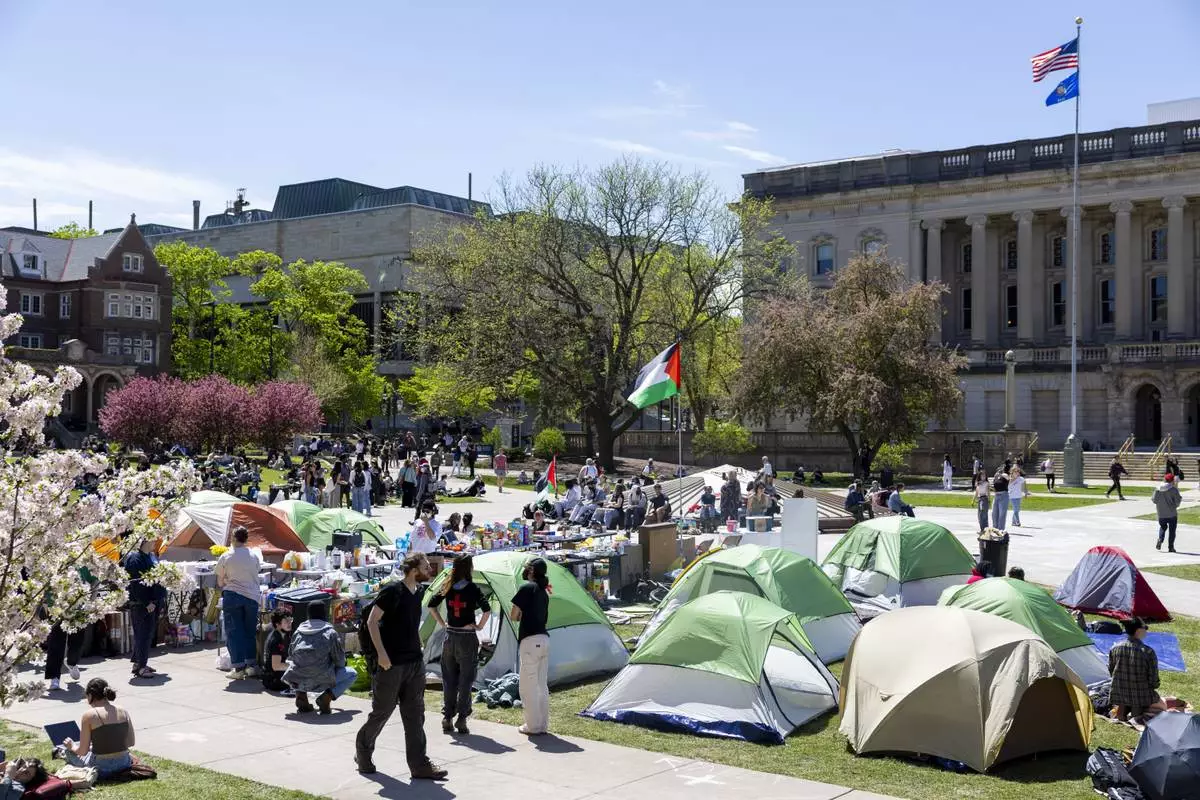
Pro-Palestinian demonstrators continue their encampment at Library Mall on the campus of the University of Wisconsin in Madison, Wis., Wednesday, May 1, 2024. (Samantha Madar/Wisconsin State Journal via AP)

Protesters watch police activity while standing on a construction barrier on the UCLA campus Wednesday, May 1, 2024, in Los Angeles. (AP Photo/Jae C. Hong)

Protesters are taken into custody as law enforcement dismantle an encampment by pro-Palestinian students at the University of Texas at Dallas' Chess Plaza on Wednesday, May 1, 2024, in Richardson, Texas. (Juan Figueroa/The Dallas Morning News via AP)
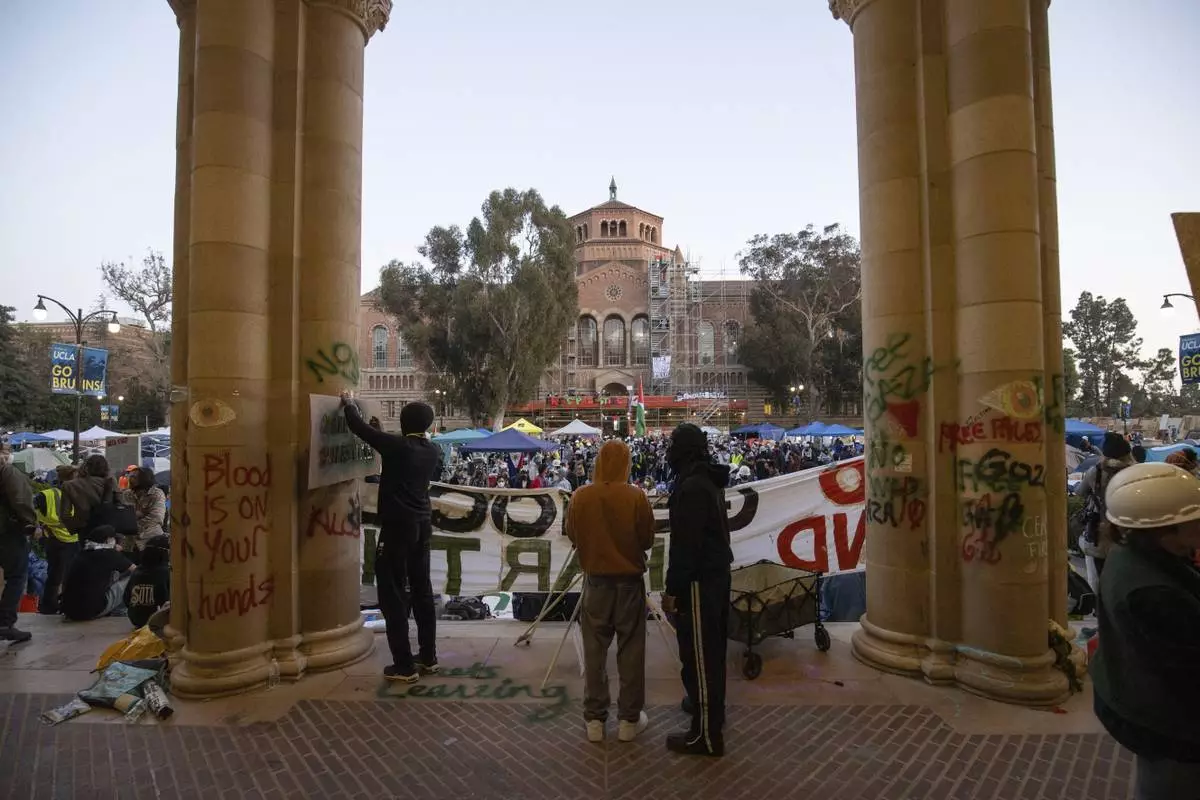
Pro-Palestinian demonstrators gather on the UCLA campus Wednesday, May 1, 2024, in Los Angeles. (AP Photo/Ethan Swope)

Pro-Palestinian demonstrators embrace while charging devices at an encampment on the UCLA campus Wednesday, May 1, 2024, in Los Angeles. (AP Photo/Ethan Swope)
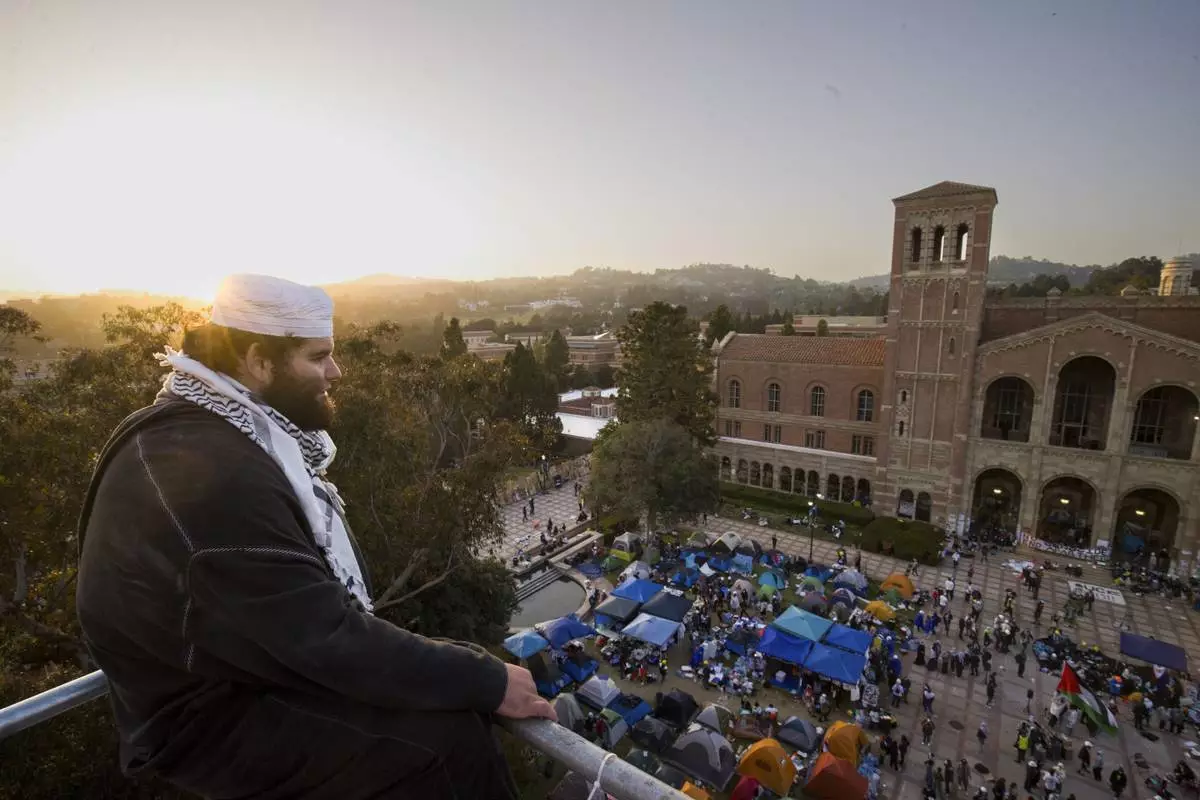
A demonstrator watches an encampment from a construction scaffold on the UCLA campus, after clashes between Pro-Israel and Pro-Palestinian groups, Wednesday, May 1, 2024, in Los Angeles. (AP Photo/Ethan Swope)

Pro-Palestinian demonstrators lock arms on the UCLA campus Wednesday, May 1, 2024, in Los Angeles. (AP Photo/Jae C. Hong)

UCLA professor Nick Shapiro speaks at a news conference on the UCLA campus, after nighttime clashes between Pro-Israel and Pro-Palestinian groups, Wednesday, May 1, 2024, in Los Angeles. (AP Photo/Jae C. Hong)

Demonstrators restore a protective barrier at an encampment on the UCLA campus, the morning after clashes between Pro-Israel and Pro-Palestinian groups, Wednesday, May 1, 2024, in Los Angeles. (AP Photo/Jae C. Hong)
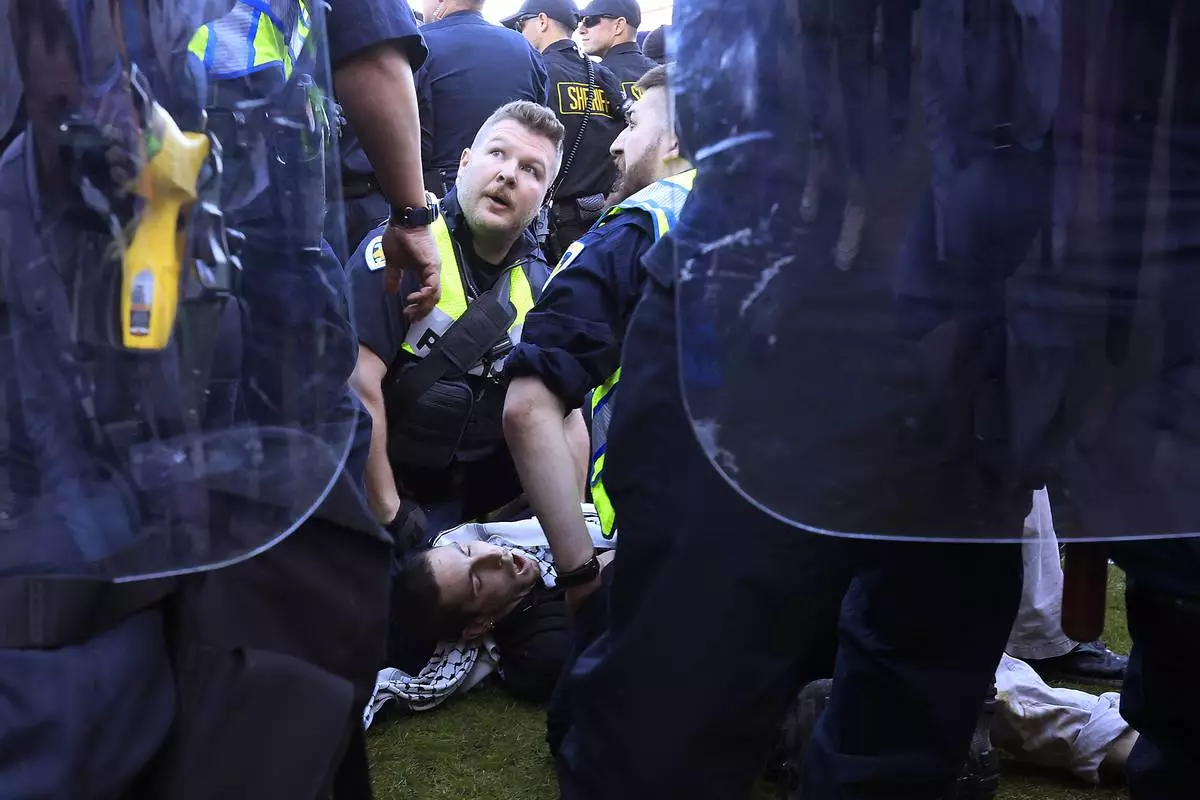
Police detain a demonstrator protesting the war in Gaza as they work to remove a non-sanctioned encampment on the campus of UW-Madison in Madison, Wis., on Wednesday, May 1, 2024. (John Hart/Wisconsin State Journal via AP)
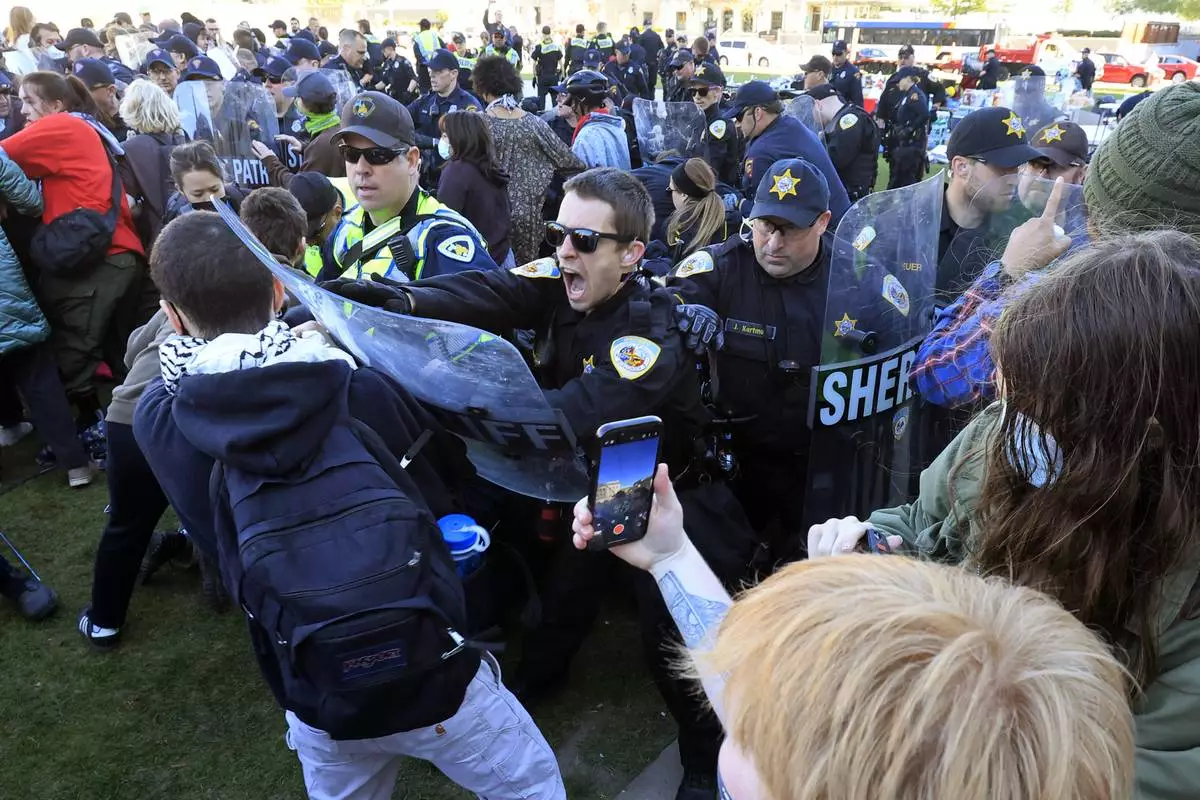
Police push back on demonstrators protesting the war in Gaza as they work to remove a non-sanctioned encampment on the campus of UW-Madison in Madison, Wis., on Wednesday, May 1, 2024. (John Hart/Wisconsin State Journal via AP)

Madison Police carry a demonstrator protesting the war in Gaza as they work to remove a non-sanctioned encampment on the campus of UW-Madison in Madison, Wis., on Wednesday, May 1, 2024. (John Hart/Wisconsin State Journal via AP)
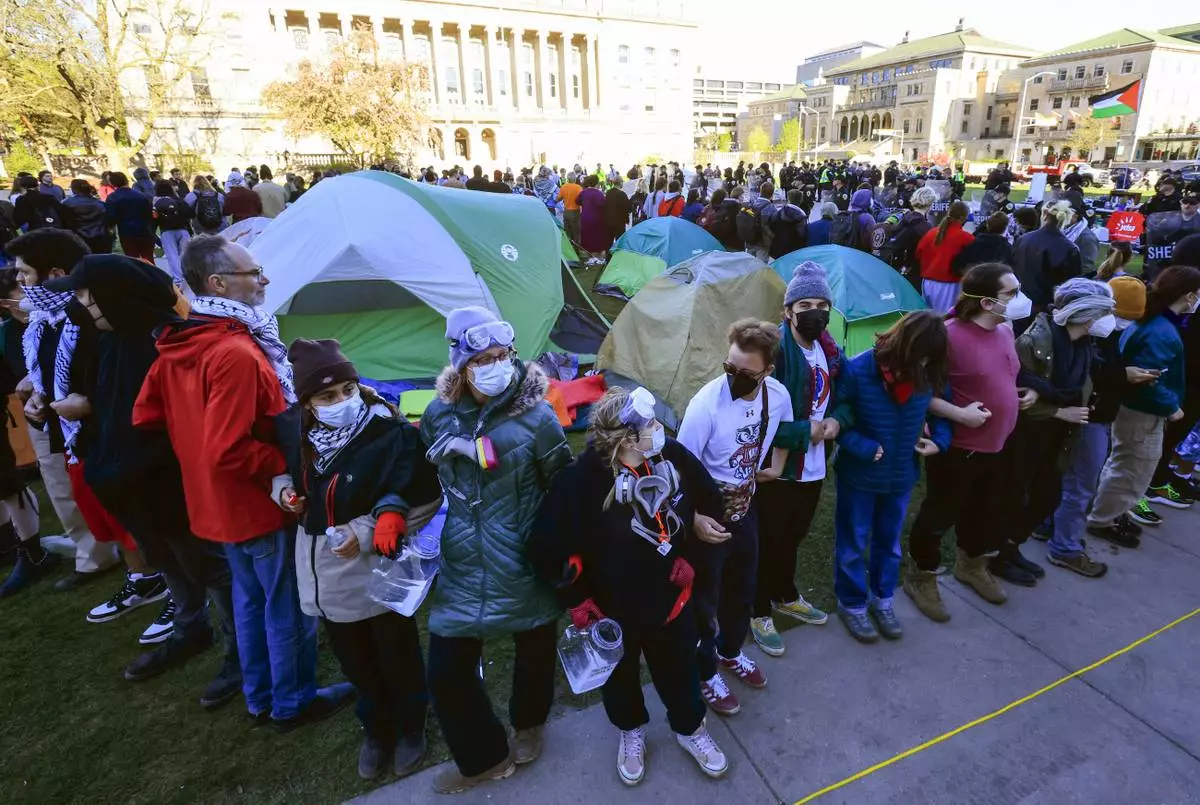
Protesters demonstrating against the war in Gaza circle a tent as law enforcement personnel prepare to remove an encampment on the campus of UW-Madison in Madison, Wis. on Wednesday, May 1, 2024. (John Hart/Wisconsin State Journal via AP)
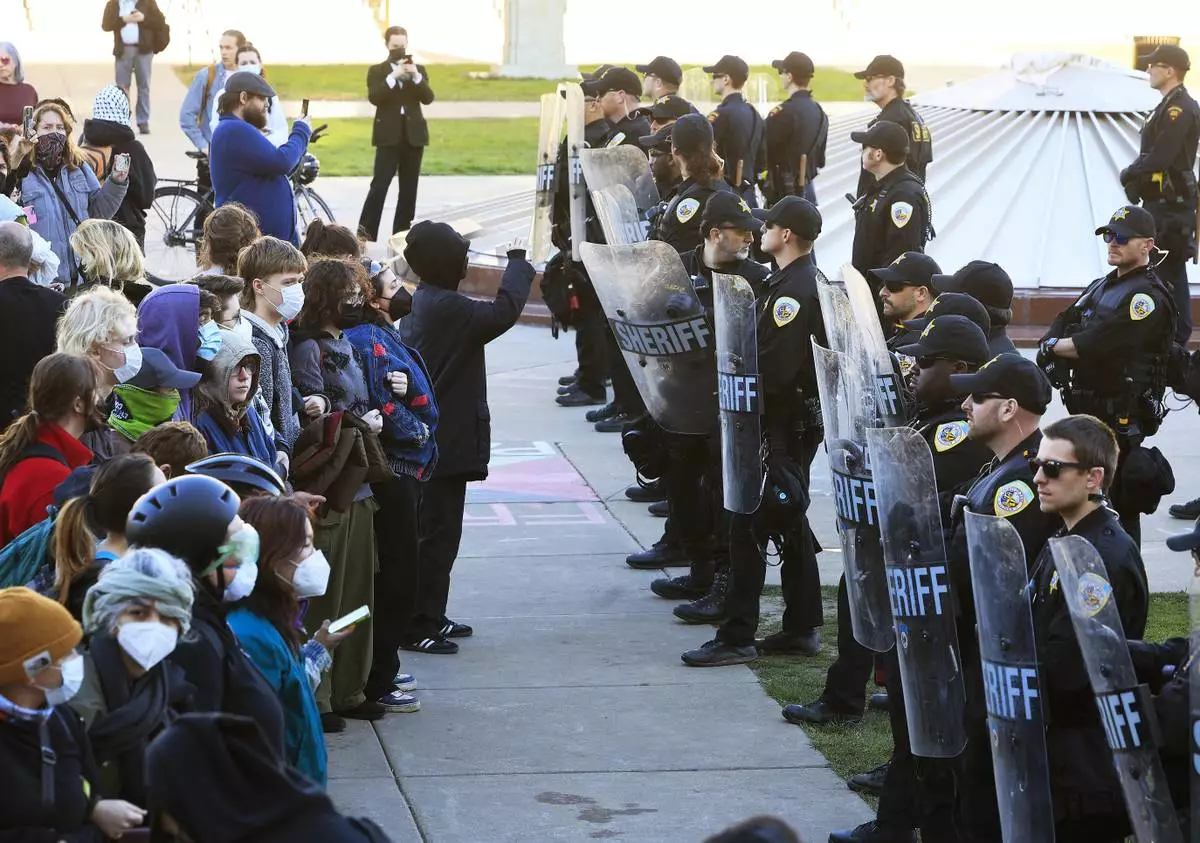
Protesters against the war in Gaza confront law enforcement personnel during demonstrations on the campus of UW-Madison in Madison, Wis. on Wednesday, May 1, 2024. (John Hart/Wisconsin State Journal via AP)

A woman paints on a barrier during a protest set up in a plaza at the University of Texas at Dallas, Wednesday, May 1, 2024, in Richardson, Texas. (AP Photo/LM Otero)

Demonstrators restore a protective barrier at an encampment on the UCLA campus, the morning after clashes between Pro-Israel and Pro-Palestinian groups, Wednesday, May 1, 2024, in Los Angeles. (AP Photo/Jae C. Hong)
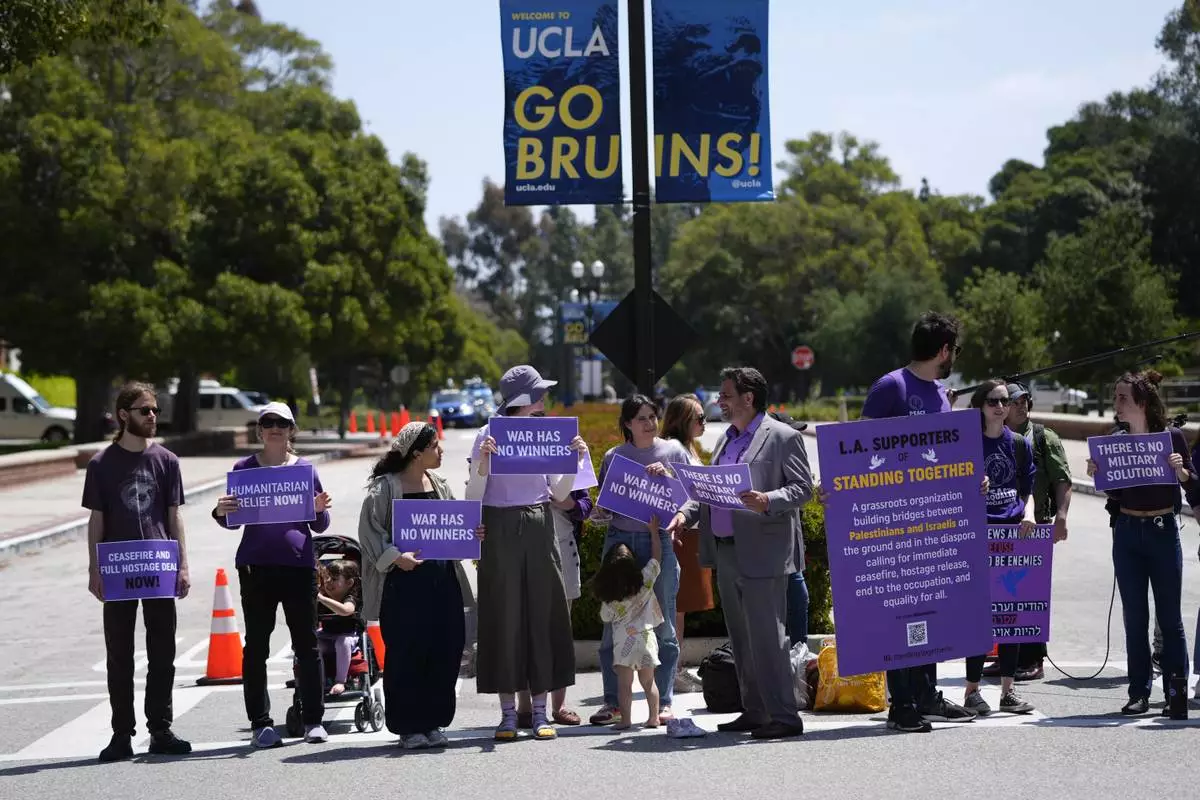
Demonstrators hold signs on the UCLA campus, the morning after clashes between Pro-Israel and Pro-Palestinian groups, Wednesday, May 1, 2024, in Los Angeles. (AP Photo/Jae C. Hong)
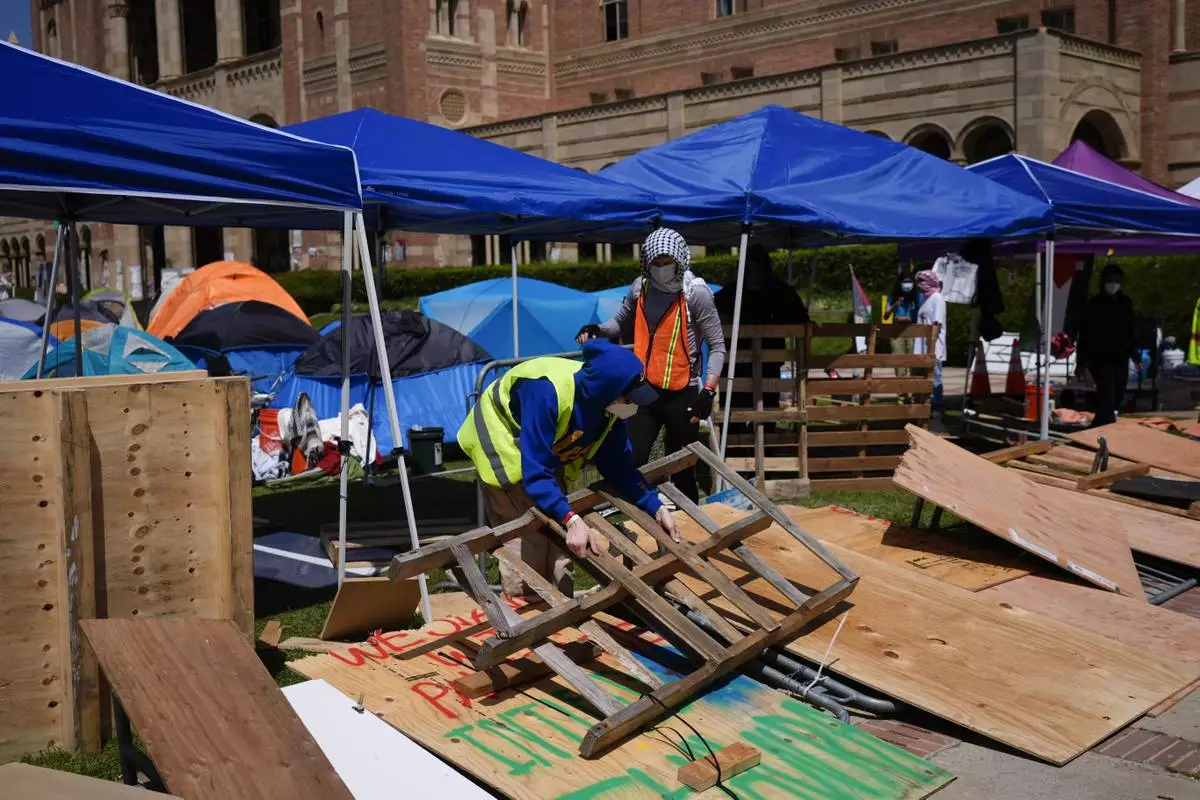
Demonstrators restore a protective barrier at an encampment on the UCLA campus, the morning after clashes between Pro-Israel and Pro-Palestinian groups, Wednesday, May 1, 2024, in Los Angeles. (AP Photo/Jae C. Hong)
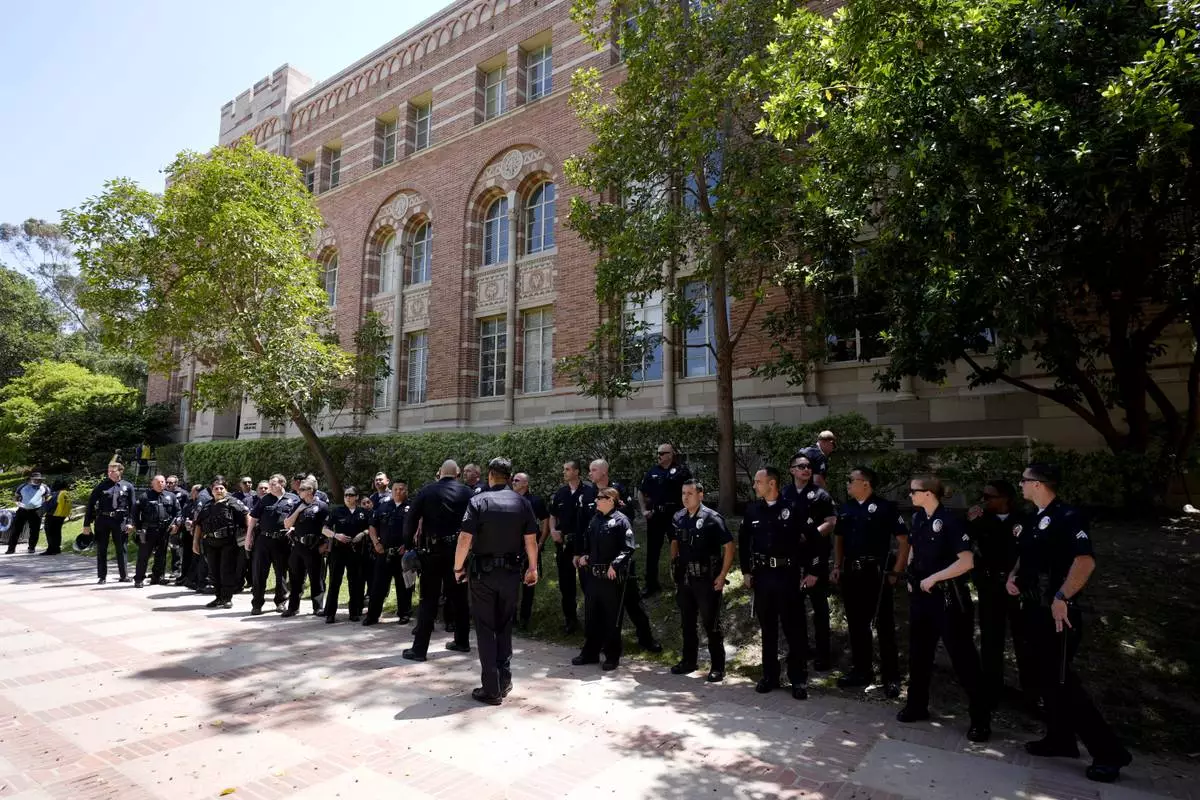
Police stage on the UCLA campus, after nighttime clashes between Pro-Israel and Pro-Palestinian groups, Wednesday, May 1, 2024, in Los Angeles. (AP Photo/Jae C. Hong)

An officer stands outside a Gaza Solidarity Encampment at the University of Pennsylvania in Philadelphia, Wednesday, May 1, 2024. (AP Photo/Matt Rourke)

Republican U.S. Senate candidate Dave McCormick speaks outside a Gaza Solidarity Encampment at the University of Pennsylvania in Philadelphia, Wednesday, May 1, 2024. (AP Photo/Matt Rourke)
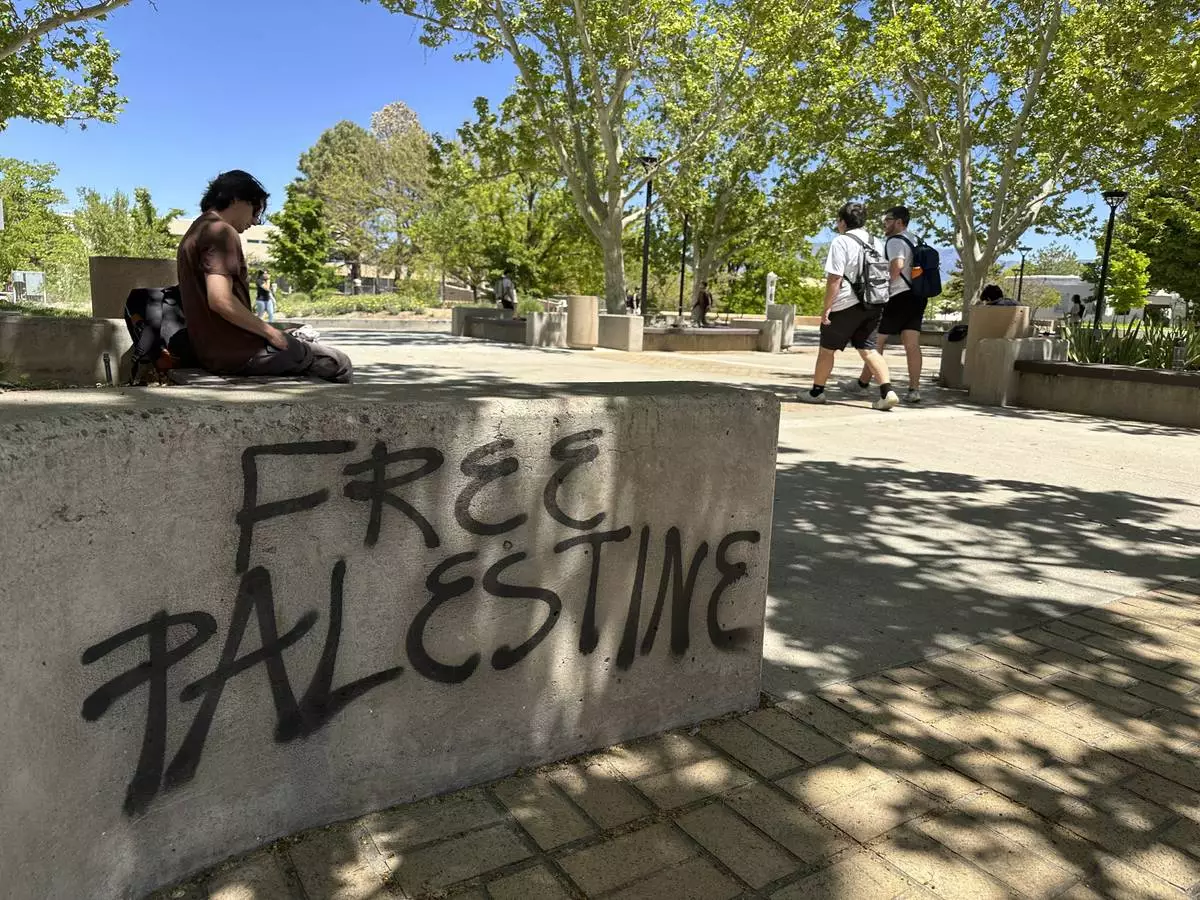
Students walk by one of the spray-painted messages left by those protesting the Israel-Hamas war on the University of New Mexico campus in Albuquerque, New Mexico, Wednesday, May 1, 2024. Sixteen people, including five students, were arrested earlier this week when they occupied the Student Union Building, causing damage inside. (AP Photo/Susan Montoya Bryan)
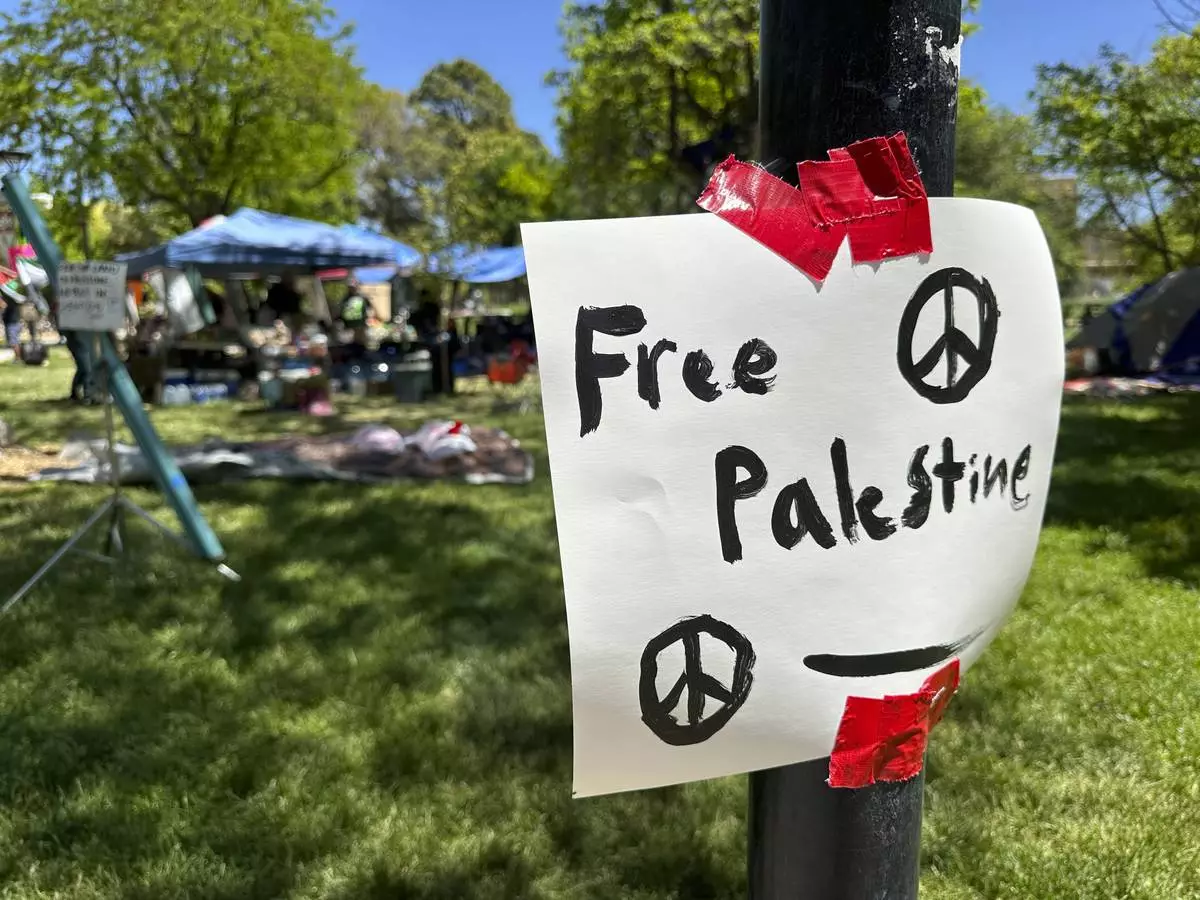
Posters surround an encampment established by University of New Mexico students and supporters who are protesting the Israel-Hamas war, on the main campus in Albuquerque, N,M., on Wednesday, May 1, 2024. (AP Photo/Susan Montoya Bryan)
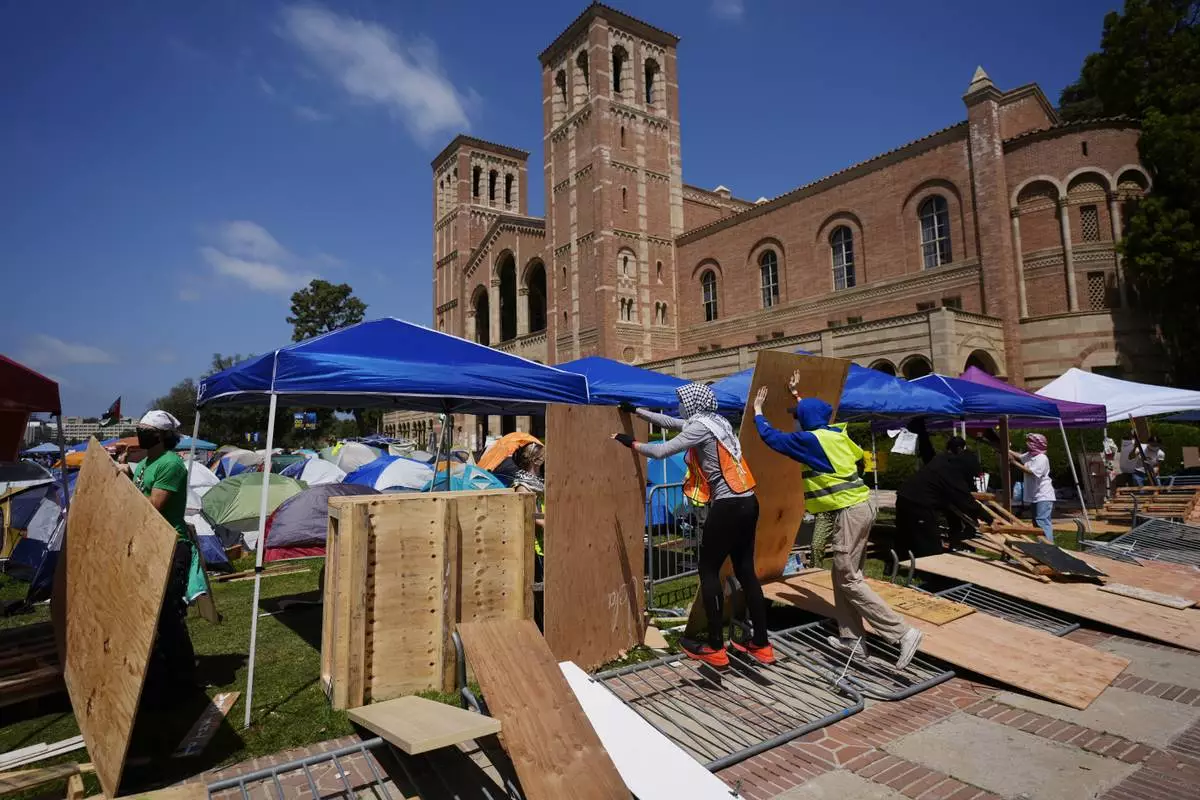
Demonstrators restore a protective barrier at an encampment on the UCLA campus, the morning after clashes between Pro-Israel and Pro-Palestinian groups, Wednesday, May 1, 2024, in Los Angeles. (AP Photo/Jae C. Hong)
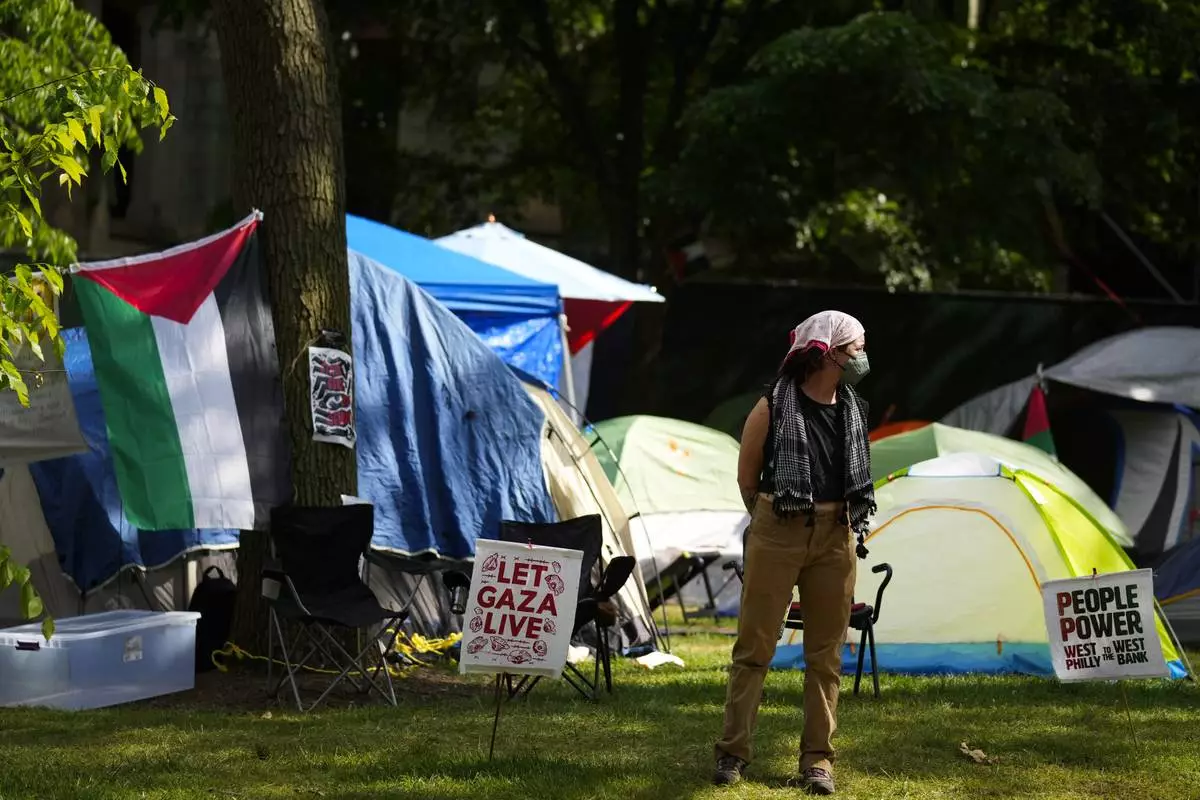
A person stands at a Gaza Solidarity Encampment at the University of Pennsylvania in Philadelphia, Wednesday, May 1, 2024. (AP Photo/Matt Rourke)
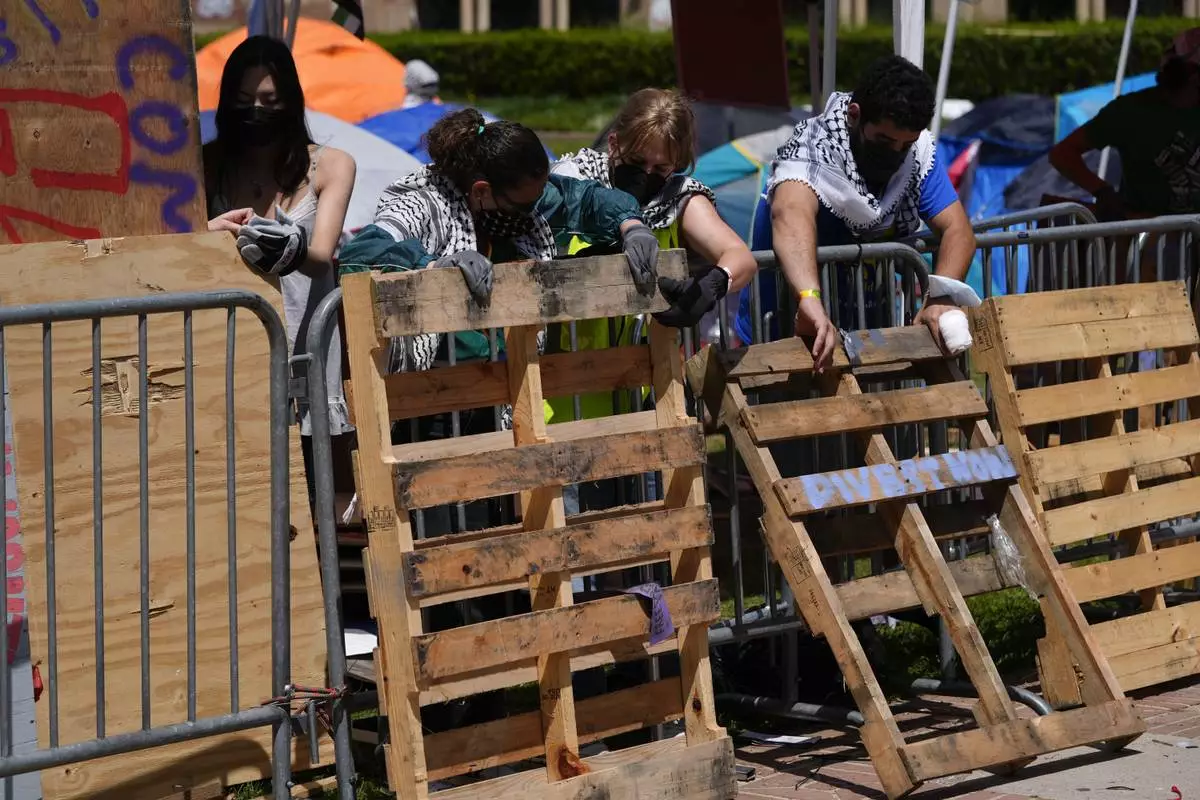
Demonstrators restore a protective barrier at an encampment on the UCLA campus, the morning after clashes between Pro-Israel and Pro-Palestinian groups, Wednesday, May 1, 2024, in Los Angeles. (AP Photo/Jae C. Hong)
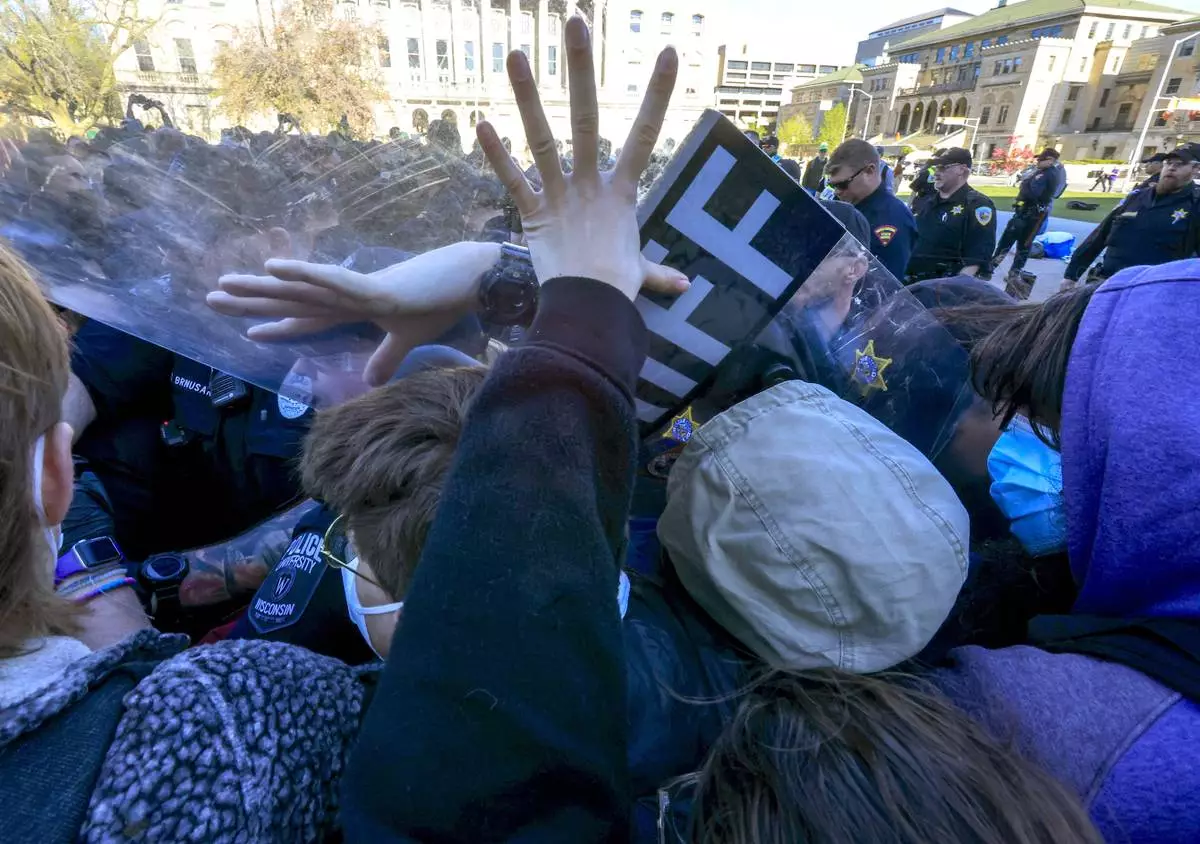
Demonstrators against the war in Gaza clash with law enforcement personnel during demonstrations on the campus of UW-Madison in Madison, Wis. on Wednesday, May 1, 2024. (John Hart/Wisconsin State Journal via AP)

Law enforcement personnel clash with demonstrators protesting the war in Gaza as they work to remove a non-sanctioned encampment on the campus of UW-Madison in Madison, Wis. on Wednesday, May 1, 2024. (John Hart/Wisconsin State Journal via AP)
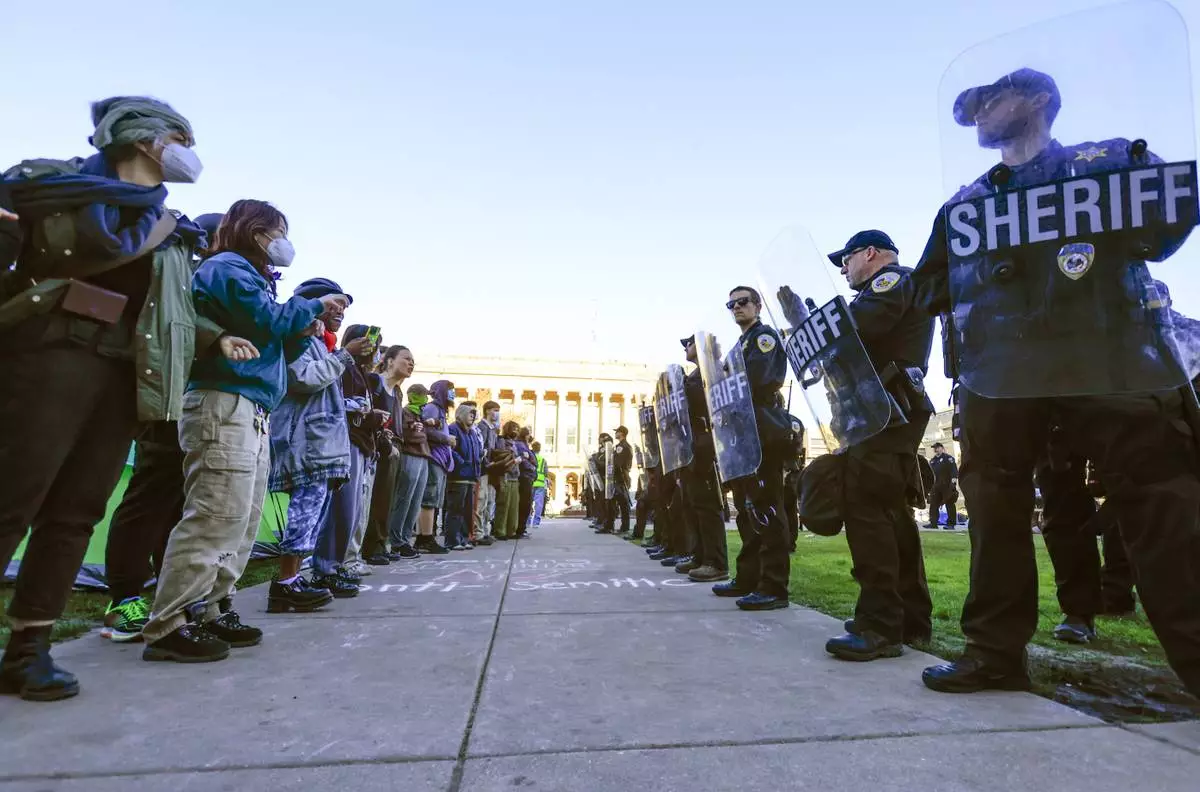
Protesters against the war in Gaza confront law enforcement personnel during demonstrations on the campus of UW-Madison in Madison, Wis. on Wednesday, May 1, 2024. (John Hart/Wisconsin State Journal via AP)
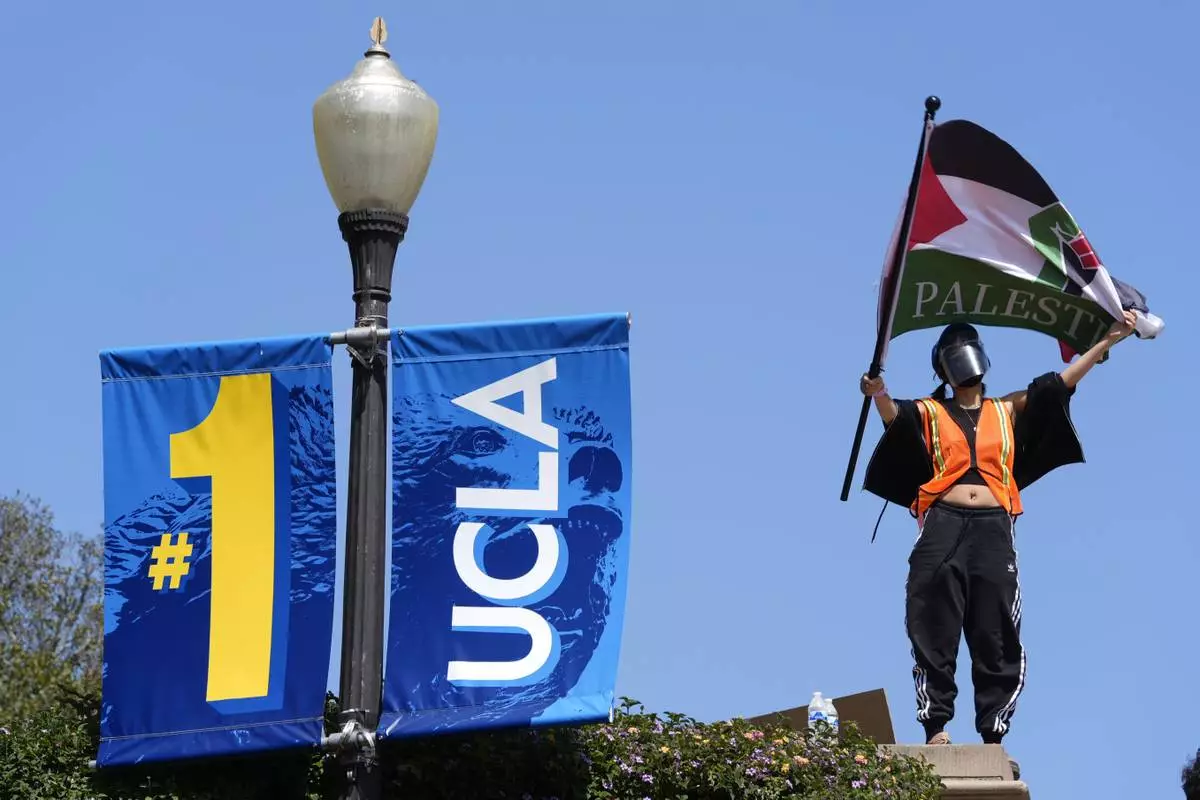
Demonstrators wave flags on the UCLA campus, after nighttime clashes between Pro-Israel and Pro-Palestinian groups, Wednesday, May 1, 2024, in Los Angeles. (AP Photo/Jae C. Hong)
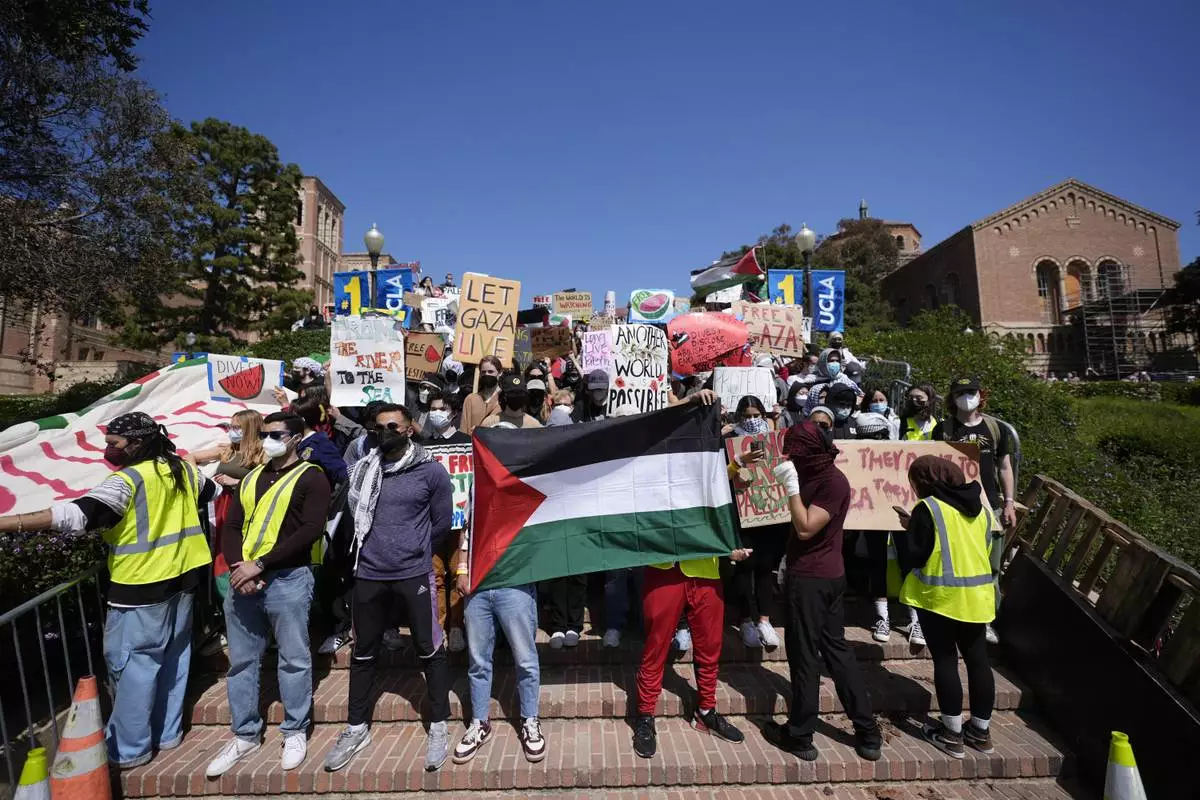
Demonstrators gather on the UCLA campus, after nighttime clashes between Pro-Israel and Pro-Palestinian groups, Wednesday, May 1, 2024, in Los Angeles. (AP Photo/Jae C. Hong)

Demonstrators lock arms on the UCLA campus, after nighttime clashes between Pro-Israel and Pro-Palestinian groups, Wednesday, May 1, 2024, in Los Angeles. (AP Photo/Jae C. Hong)





